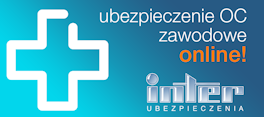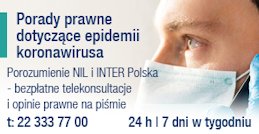Warmia and Mazury Medical Chamber in Olsztyn,
Żołnierska Str. 16 C,
10-561 Olsztyn
Poland
e-mail:
Adres poczty elektronicznej jest chroniony przed robotami spamującymi. W przeglądarce musi być włączona obsługa JavaScript, żeby go zobaczyć.
tel.: +48 89 539 19 29
EXCERPTS FROM THE HISTORY
The first Polish organization of the professional self-government of physicians, namely the Collegium Medicorum Gedanensis, was established in Gdansk in the early 17th century. It was established by physicians with the aim of restricting activities of quacks and charlatans. Władysław IV Vasa, the king of Poland at that time, issued a law in 1636 which granted multiple rights and privileges to physicians.
Before 1918, the Polish self-government of physicians existed in the territory of the Austrian and Prussian partitions. Upon restoration of Poland's independence after the partitions, physicians' chambers were set up in 1921 through a Law adopted by the Parliament (Sejm). At that time, the Polish (Supreme) Chamber of Physicians was a significant opinion-forming authority. The Law was amended in 1934, and the Chambers of Dentists were set up in 1938.
The German occupation, followed by Soviet occupation, led to degradation of self-government activities in Poland.
The chambers were reactivated in 1945, but following introduction of compulso-ry administrators in 1946 by the department of health, the attempt turned out to be successful only to a limited extent. Professional corporations ceased to exist in 1952.
The 1980s brought about political engagement of a vast majority of the popula-tion and great hopes followed. Physicians and dentists from various democratic opposition, scientific and political environments contributed to restoration of the self-government movement, including physicians and dentists from the "So-lidarity" trade union, activists of the Polish Medical Society, the Polish Dental Society, physicians elected as members of the Polish Parliament. On 17 May 1989, the Law on Chambers of Physicians and Dentists was passed and the medical and dental self-government was reactivated.
A periodical entitled "Zeszyty Niezależnej Myśli Lekarskiej" recorded the following memory of that year: "The Sejm [lower house of Polish Parliament] adopted the Law on Chambers of Physicians and Dentists.... We have not managed to enact many of the amendments we intended, but the general framework of the Law should be considered satisfactory. The most important thing is that it guarantees a high degree of autonomy for the Chambers and their independence from political and administrative factors...''
In 2009, the 1989 Law was replaced with a new Law, which to a significant extent was elaborated by the self-government itself.
ORGANIZATION OF PHYSICIANS' AND DENTISTS PROFESSIONAL SELF-GOVERNMENT IN POLAND
The organizational bodies of the professional self-government of physicians and dentists include the Polish (Supreme) Chamber of Physicians and Dentists and the regional chambers of physicians and dentists.
Every physician and dentist authorized to practice his/her profession in Poland is a chamber s member by virtue of the law.
At the moment, there are 23 regional chambers and a Military Chamber located in Warsaw, the latter operating nationwide with a legal status of a regional chamber.
The largest number of practicing physicians and dentists is registered with the Regional Chamber of Physicians and Dentists in Warsaw (over 28 thousand), and the lowest with the Regional Chamber in Gorzów Wielkopolski (over 1 thousand).
The Polish Chamber of Physicians and Dentists as well as the regional chambers have legal personality and are independent bodies of professional self-government of physicians and dentists, subordinated only to the rules of law.
The Polish Chamber of Physicians and Dentists represents the professional self-government of physicians and dentists at State level, while the regional medical councils at regional level.
The supreme organ of the Polish Chamber of Physicians and Dentists is the General Medical Assembly, and the supreme organs for each regional chamber are regional medical assemblies.
During the intervals between general assemblies, activities of the Polish Chamber of Physicians and Dentists are managed by the Supreme Medical Council, and activities of regional chambers by regional medical councils.
Delegates for regional assemblies are elected in constituencies covering all the Polish physicians and dentists. Regional assemblies elect the president and members of the respective regional medical council, regional screeners for professional liability, members of medical courts and delegates to the General Assembly. During the General Assembly, elections are held of the President of the Supreme Medical Council, Members of the Supreme Medical Council, the Supreme Scre-ener for Professional Liability and his deputies, members of the Supreme Medical Court, the Supreme Audit Committee and the National Election Committee. Physicians and dentists have equal rights in their joint self-government.
Dentists are represented at all levels of regional chambers organization, and their number in self-government bodies of the regional chambers is in proportion to the number of physicians, also in the Supreme Medical Council. A dental practitioner can be elected President of the Medical Council. At least one Vice-President of the Medical Council and at least one Deputy in other bodies of the organization has to be a dental practitioner.
Dental Practitioners' Committees of regional medical councils and the Supreme Medical Council are responsible for all matters specifically concerned with dental practice and the functioning of the dental care system; the Supreme Medical Council is also in charge of international cooperation in the field of dentistry.
The term of office of the organs of the chambers is 4 years. The current term of office is the sixth term since reactivation of chambers of physicians and dentists in Poland in 1989.
THE SUPREME MEDICAL COUNCIL
The role of the Supreme Medical Council as prescribed by the Law on Chambers of Physicians and Dentists is to:
- supervise proper and reliable exercise of the professions of physician and dentist by members of the self-government;
- promote the rules of medical ethics and assure compliance with these rules;
- represent and protect the vocational interests of self-government members;
- implement resolutions of the General Medical Assembly;
- supervise the correct execution of tasks of the self-government of physicians and dentists;
- support, coordinate and supervise the activities of regional medical councils;
- represent the medical and dental professions before the public administration agencies and other organizations;
- define the terms of passing resolutions by the bodies of chambers;
- adopt the rules of financial management for the professional self-government;
- fix the membership fees;
- examine appeals against resolutions of regional medical councils;
- analyze, issue opinions and propose new development directions for the healthcare system;
- adopt budget of the Supreme Medical Council and examine budget perfor-mance reports;
- keep the Central Register of Physicians and Dental Practitioners of the Republic of Poland;
- keep the Register of Punished Physicians and Dental Practitioners of the Republic of Poland;
- publish the Newsletter of the Polish Chamber of Physicians and Dentists;
- publish the "Gazeta Lekarska" periodical;
- present reports on proceedings to the General Medical Assembly.
The General Medical Assembly currently consists of 475 delegates. The Supreme Medical Council is composed of 75 members: 51 elected during the General Medical Assembly and 24 Presidents of regional medical councils.
Source: The Polish Chamber of Physicians and Dentists




























